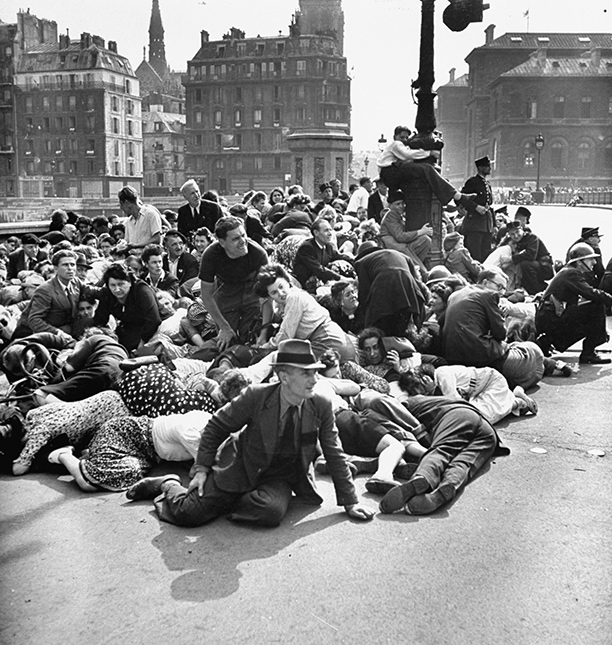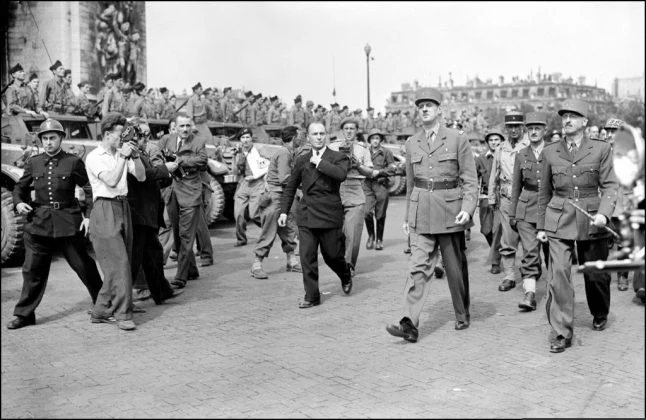The Paris Uprising and the French Resistance
By: Remi Fleischmann, Abigial Feller, and Yaitza Zambrano




The thesis: France quickly falls to Nazi Germany after only six weeks of fighting in early 1940. The occupation known as Vichy France lasted until the liberation of France, commonly accepted and credited to the United States in the autumn of 1944. In truth, the French Resistance and Paris Uprising show that French citizens were already achieving their own liberation before and without US and Allied assistance.
Backround Infromation: The French Resistance and Paris Uprising took place during WWII, the French Resistance were groups of people who fought against the Nazi occupation of France and the collaborationist Vichy régime. The Nazi occupation of France was established by the Nazi Germany during WWII. Their goals were to administer the occupied zone in areas of northern and western France. Vichy France is the common name of the French State, it adapted to a new policy of collaboration with Nazi Germany, which at the time, was set up to administer the occupied zone in areas of northern and western France. As the French had started to resist, they started to find ways to go against Nazi Germany. Some started to collect military intelligence for transmission to London while others organized escape routes for British airmen. The Paris Uprising was a military battle that started on August 19, 1944, till August 25, 1944, after the German garrison surrendered the French capital. Paris had been occupied by Nazi Germany since the signing of the Second Compiègne Armistice. The Second Compiègne Armistice of June 22, 1940, divided France into two zones. One of the zones was under German military occupation, and the other one was left to the French in full sovereignty. The zone that was not occupied by anyone comprised the southeastern two-fifths of the country, from the Swiss frontier.
Theme:The theme of Diplomacy is shown in the French Resistance and Paris Uprising when France had supplied allies during WWII with important intelligence reports as well as doing a lot of work to disrupt the Germans' supplies and communication lines with France. This event has to do with debate because our use of the word debate looks deeply into the commonly accepted history regarding the liberation of France. A story, that often overlooks the role the French people themselves played in their own freedom from the Nazis and Vichy French government.
Evidence 1:" When France surrendered to Germany on 22 Jun 1940, those who resented German occupation and the Vichy government formed cells that collectively were named the French Resistance. Some groups were violent in nature, aiming to hurt or kill the German occupiers; these were called maquis. Other groups used non-violent means, publishing underground newspapers and broadcasted anti-German and anti-Vichy radio programs. Many of these groups were born after the 18 June 1940 address by Charles de Gaulle who encouraged the French people to continue the fight against the German forces even if the nation surrendered”
This piece of evidence is taken from a database. This piece of evidence shows that although the French had to surrender, they still stayed organized without their own military or any other. Maquis were formed to harm German occupiers but not all of the French Resistance was to harm. Others would use programs to help send useful information. All of this was done by the French citizens because they wanted to fight and resist the German occupiers. They organized these strategies without any help from other countries or armies. When Charles de Gaulle had given his address in 1940, people who were born after that time thought that it was only right to do as they were encouraged and to have continued to resist even if the nation's military had to surrender. The database later says, “To take advantage of these groups, the British Special Operations Executive (SOE) began infiltrating into France beginning in May 1941 to aid the resistance groups. Because de Gaulle often disagreed with his British allies, he formed his own agency to independently aid French resistance efforts without coordinating with British efforts.” This piece of evidence means that although the British thought that the French were in dire need of assistance, de Gaulle planned accordingly to prove that the French were doing just fine on their own. They had their own way of resisting without needing another allied military to help. Our thesis statement says that the French were receiving their own liberation before or without US-allied assistance.
Evidence 2: “After defeating the German forces in Normandy, Allied armies rushed through France, trying to catch up retreating German troops. The liberation of Paris didn’t have priority, also because of the risk of damaging the town. On 19 August 1944 however, the French resistance caused an uprising in Paris against the Germans. The German commander of Paris, Lieutenant-General Choltitz, was ordered to crush the insurrection and to destroy the city, as the Germans did in Warsaw.” “Today, these are all iconic scenes, but the liberation of Paris almost did not happen in the summer of 1944. For U.S. and British military officials at the time, Paris was simply not a high priority. They saw the capture of the French capital as ancillary to the main Allied objective: ending the war in Europe as quickly as possible by compelling the surrender of Germany, in order to pivot their focus to the Pacific Theater and the war against Japan.”
These pieces of text that will help us establish our evidence, came from articles. These excerpts from articles show that although the liberation of Paris was clearly not a priority to the allied forces during this time, Paris still managed to continue their fight for its own freedom. While this was happening, the allied forces decided to catch up to the German troops that had been retreating once they had been defeated by France and others. We can only assume that other troops did this because either they didn’t care enough about France and only cared about saving Europe, or they thought that Paris was going to get destroyed so it was a lost cause anyway. Later, on August 19, of 1944, the German commander for Paris, Lieutenant-General Choltitz, was told to destroy the city of Paris and crush the insurrection. This happened as the Germans were doing the same in Warsaw, Poland. The second piece of text that we are using states that the “liberation of Paris almost did not happen in the summer of 1944.” This is because allied troops had partially given up on saving Paris and again, Paris was just not a priority. Most other allied countries saw getting the French capital as an addition to ending the part of the war that was in Europe. Considering all of this, although Paris and/or France had been anticipating help from other countries, they still had been successful after being disregarded. They fought for their liberation and got it in the end.
Evidence 3:
https://www.historynet.com/french-resistance-resistant.htm
"For every German killed by the Resistance, the Nazis would kill dozens, even hundreds, of civilians. At first the Germans chose victims from among existing prisoners—communists, anarchists, Gaullists and other categories of offenders. Eventually, however, they became less discriminating about whom they shot or hanged. In such reprisals the Germans killed an estimated 30,000 innocent French men and women by the time of the liberation.
"The most valuable work the French Resistance did was to provide, for the British and later the Americans, pre-invasion intelligence about German troop movements and coastal defenses, as well as accurate maps and photos to be used by D-Day planners."
This website helped us establish our thesis because it shows that if the allied forces were helping the French resistance and their liberation, they probably would have paid attention to their artificial intelligence. The French provided pre-invasion intelligence for the allies and they chose not to give any attention to it. They thought of it as beginner technology and that the allied forces could do much better on their own without the French. They didn’t care to give France their liberation so they didn’t appreciate any of the messages. Also, the Germans or Nazi’s were only torturing or going after the French when Germans had been killed. We think that if the allied forces had been at the front of the resistance, they would have also been harmed but there was no mention of that. Forty percent of the resistance broadcasts were broadcasted where only the Germans were able to hear it. Charles de Gaulle had single handedly established the Free French government in exile and he also claimed credit for instigating the French Resistance. De Gaulle at the time was a General for France. This shows that Charles de Gaulle formed the breakthrough without the allies that were supposed to be there. The allies rejected all information from France and did not prioritize another European country. Although the British and American forces were unable to hear the broadcasts from France, they probably knew that the French were trying to communicate with them and did not make an effort to discover their messages.
Evidence 4: Recording goes here.
Charles de Gaulle gave a speech in 1944 once Paris had been liberated and had gained its freedom. In his speech, he said Paris was liberated by themselves. He said, “But Paris liberated! Liberated by itself, liberated by its people with the help of the French armies, with the support and the help of all France, of the France that fights, of the only France, of the real France, of the eternal France!” When he says this, he is saying that Paris was able to achieve what they wanted without the allied forces that had claimed credit for another country’s freedom. De Gaulle says that the French men and women fought for their freedom. Charles de Gaulle also says the only people who would fight from beginning to end and would not rest until they got their freedom are the people of France and Paris. General Charles de Gaulle also claims that to save a country like this takes unity and the allied forces would not have that if they were not willing to sacrifice for a European country. If the General says that you need unity to win a war, that obviously should come from the country but if another armed force is taking credit for another country’s freedom, they should have shown more dedication and unity. I think this piece of text proves our thesis more than any other because it shows that the General believed that France had gained their independence without help although it has not been recorded that way.
Conclusion: In this project we were trying to prove that France had gained their liberation on their own without the United States and allied forces help. It is commonly credited to the US for giving the French their freedom. These pieces of evidence prove that the French government had done it on their own. They gained the freedom for their people. Each piece of text suggests that the allied forces were nowhere to be found and the French were at the front line fighting for their freedom. Overall even though the allies helped the resistance a lot, the paris uprising and french resistances help should not be forgotten.
Annotated Bibliography/ Chicago and/or Illinois connection:
Annotated Bibliography: https://docs.google.com/document/d/1Env3ybar9CD7Jeg8l3RfiwfmlDLvmsiTBNWkUPO0Kt0/edit
Chicago/Illinois connection: "In all, 8-10 million refugees fled their homes to try to escape the Nazi invasion – almost a quarter of the French population at the time." Many of which escaped to chicago.